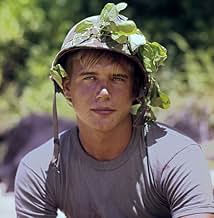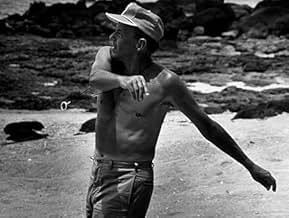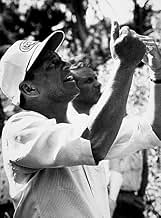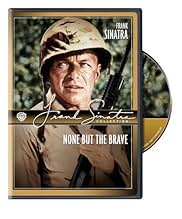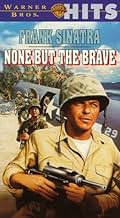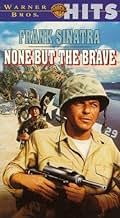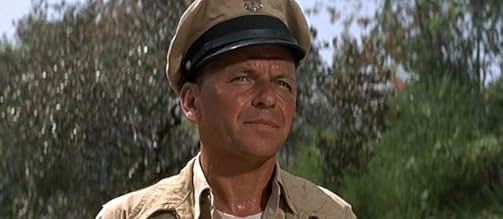CALIFICACIÓN DE IMDb
6.4/10
2.2 k
TU CALIFICACIÓN
Durante la Segunda Guerra Mundial, un pelotón de marines se estrella en una pequeña isla del Pacífico ocupada por una pequeña unidad japonesa.Durante la Segunda Guerra Mundial, un pelotón de marines se estrella en una pequeña isla del Pacífico ocupada por una pequeña unidad japonesa.Durante la Segunda Guerra Mundial, un pelotón de marines se estrella en una pequeña isla del Pacífico ocupada por una pequeña unidad japonesa.
- Dirección
- Guionistas
- Elenco
Takeshi Katô
- Sgt. Tamura
- (as Takeshi Kato)
Tôru Ibuki
- Pvt. Arikawa
- (as Toru Ibuki)
Ryûchô Shumpûtei
- Pvt. Okuda
- (as Ryucho Shunputei)
- Dirección
- Guionistas
- Todo el elenco y el equipo
- Producción, taquilla y más en IMDbPro
Opiniones destacadas
The title is from John Dryden's poem, "Alexander's Feast", stanza 1: "None but the brave/ deserve the fair" . Sinatra's directorial debut , it results to be an efficient effort , a straightforward and gripping movie , being the first Japanese/American co-production . During WWII , an American bomber aircraft is gunned down and crashes on an island (the plane flown that was shot down was R4D, C47 transport) . American and marooned Japanese soldiers (survivors from a Japanese battalion) are stranded on a tiny Pacific island , in the Salomons , during World War II . But in this uninhabited island in the Pacific Ocean there is one Japanese military group and both of them stranded together . There takes place a physical and psychological battle between American/Japanese with anti-war allegory . After a skirmish , the two bunches initiate a fragile truce with the understanding that fighting will resume if one or the other sends for help . The Japanse detachment (who are mercifully allowed to speak Japanese) is commanded Lt. Kuroki (Tatsuya Mihashi) , as the film being told through the eyes of this Japanese unit commander . The American group is commanded by Capt. Dennis Bourke (Clint Walker) who must deal with an atmosphere of growing distrust and tension between their men . They confront each other in a violent mini-war but then come to terms with each other . . There , they must cease their hostility and unite themselves if they want to survive until a disappointing and unexpected ending . The Marines hold heavy weapons : M1 , Grease gun , carbine and 45 cal pistol against the Japanese rifle and hand grenade . Soonafter , the American attempt to capture a boat laboriously built by the Japanese . The American repair their radio unit ; then , things go wrong and they must decide on their next unsettling actions . This movie's closing end coda states: "Nobody Ever Wins" .
Nice and well executed film set during WWII , containing a brief anti-war declaration . The plot is plain as well as simple and prefigures ¨John Boorman's Hell in Pacific¨ , dealing with a platoon of Marines crash-lands on a tiny Pacific island occupied by a small Japanese unit and must make a temporary truce and cooperate to survive various tribulations . The film has a carefully constructed mood as the two groups warily circle each other and spasmodically clashing in battle , including an anti-war message ingeniously overplayed . However , being stupidly fractured by two inappropriate flashbacks , obviously designed to provide the ordinary love interest . The movie sometimes lapses into tedium and slowness , though contains striking images with moments of great power and adequate scenarios . Here Sinatra gives a very good acting as the sympathetic but drunk doctor . Known as "One-Take Charlie" for his approach to acting that strove for spontaneity and energy, rather than perfection , Sinatra was an instinctive actor who was best at playing parts that mirrored his own personality . The remaining cast is pretty good , such as : the tall Clint Walker who bears the main role , Brad Dexter from Magnificent seven , Tony Bill , Rafer Johnson as Pvt. Johnson , Tommy Sands who co-stars in the movie divorced Nancy Sinatra, Frank Sinatra's daughter , the same year this picture came out and Richard Sinatra , Frank Sinatra's cousin, appears as Private Roth . And special mention for Tatsuya Mihashi as Lt. Kuroki .
This is the first Japanese-American co-production, produced by Kikumaru Okuda for Toho Studios and by Frank Sinatra for Warner Brothers , being professionally directed by Frank who displays great competence as an action filmmaker with some scenes that are decently choreographed and memorable fight shots of both sides when they destroy their means of getaway . Frank Sinatra's only film as director and his 6th out of nine films as producer , though he also made 2 episodes ,¨The Frank Sinatra Show¨ TV Series . Sinatra's biggest hit was his role as Maggio in From Here to eternity (1953) . He won an Oscar for best supporting actor and followed this with a scintillating performance as a cold-blooded assassin hired to kill the US President in Suddenly (1954). Arguably a career-best performance , garnering him an Academy Award nomination for Best Actor , was his role as a pathetic heroin addict in the powerful drama The man with the Golden arm (1955). He continued to give strong and memorable performances in such films as Guys and dolls (1955) and Some come running (1958). In the late 1950s and 1960s Sinatra became somewhat prolific as a producer, turning out such films as A hole in the head (1959) , Sergeant 3 (1962) and the very successful Robin and 7 Hoods (1964). Lighter roles alongside "Rat Pack" buddies Dean Martin and Sammy Davis Jr. were lucrative, especially the famed Ocean's eleven (1960). On the other hand, he alternated such projects with much more serious offerings, such as The Manchurian Candidate (1962), regarded by many critics as Sinatra's finest picture . That same year Von Ryan (1965) was a box office sensation . In 1967 Sinatra returned to familiar territory in Sidney J. Furie's The naked runner (1967) , once again playing masterfully in his only film to be shot in the U.K. and Germany . That same year he starred as a private investigator in Tony Rome (1967), a role he reprised in the sequel , Lady in cement (1968). He also starred with Lee Remick in The detective (1968), a film daring for its time with its engaging theme and it was a major box-office success.
Nice and well executed film set during WWII , containing a brief anti-war declaration . The plot is plain as well as simple and prefigures ¨John Boorman's Hell in Pacific¨ , dealing with a platoon of Marines crash-lands on a tiny Pacific island occupied by a small Japanese unit and must make a temporary truce and cooperate to survive various tribulations . The film has a carefully constructed mood as the two groups warily circle each other and spasmodically clashing in battle , including an anti-war message ingeniously overplayed . However , being stupidly fractured by two inappropriate flashbacks , obviously designed to provide the ordinary love interest . The movie sometimes lapses into tedium and slowness , though contains striking images with moments of great power and adequate scenarios . Here Sinatra gives a very good acting as the sympathetic but drunk doctor . Known as "One-Take Charlie" for his approach to acting that strove for spontaneity and energy, rather than perfection , Sinatra was an instinctive actor who was best at playing parts that mirrored his own personality . The remaining cast is pretty good , such as : the tall Clint Walker who bears the main role , Brad Dexter from Magnificent seven , Tony Bill , Rafer Johnson as Pvt. Johnson , Tommy Sands who co-stars in the movie divorced Nancy Sinatra, Frank Sinatra's daughter , the same year this picture came out and Richard Sinatra , Frank Sinatra's cousin, appears as Private Roth . And special mention for Tatsuya Mihashi as Lt. Kuroki .
This is the first Japanese-American co-production, produced by Kikumaru Okuda for Toho Studios and by Frank Sinatra for Warner Brothers , being professionally directed by Frank who displays great competence as an action filmmaker with some scenes that are decently choreographed and memorable fight shots of both sides when they destroy their means of getaway . Frank Sinatra's only film as director and his 6th out of nine films as producer , though he also made 2 episodes ,¨The Frank Sinatra Show¨ TV Series . Sinatra's biggest hit was his role as Maggio in From Here to eternity (1953) . He won an Oscar for best supporting actor and followed this with a scintillating performance as a cold-blooded assassin hired to kill the US President in Suddenly (1954). Arguably a career-best performance , garnering him an Academy Award nomination for Best Actor , was his role as a pathetic heroin addict in the powerful drama The man with the Golden arm (1955). He continued to give strong and memorable performances in such films as Guys and dolls (1955) and Some come running (1958). In the late 1950s and 1960s Sinatra became somewhat prolific as a producer, turning out such films as A hole in the head (1959) , Sergeant 3 (1962) and the very successful Robin and 7 Hoods (1964). Lighter roles alongside "Rat Pack" buddies Dean Martin and Sammy Davis Jr. were lucrative, especially the famed Ocean's eleven (1960). On the other hand, he alternated such projects with much more serious offerings, such as The Manchurian Candidate (1962), regarded by many critics as Sinatra's finest picture . That same year Von Ryan (1965) was a box office sensation . In 1967 Sinatra returned to familiar territory in Sidney J. Furie's The naked runner (1967) , once again playing masterfully in his only film to be shot in the U.K. and Germany . That same year he starred as a private investigator in Tony Rome (1967), a role he reprised in the sequel , Lady in cement (1968). He also starred with Lee Remick in The detective (1968), a film daring for its time with its engaging theme and it was a major box-office success.
Like its better known cousin HELL IN THE PACIFIC, NONE BUT THE BRAVE is a story about US and Japanese troops stranded on a desert island during WW2. It's a tense and highly watchable tale that makes Frank Sinatra's sole directorial credit, and he also co-stars in the movie as the medic of the group.
The tale is quite low key and more of a character piece than an action film. There are action scenes here, but they're few and far between and low budget. Nonetheless the film looks classy and expensive with fine cinematography that brings the lush locations to life. As an anti-war piece of filmmaking, it ploughs much the same furrow as HELL IN THE PACIFIC, exploring the way in which all soldiers are the same and the parallels between the two units despite their utmost grievances.
There are some exemplary performances amid the cast members. Clint Walker is exceptional as the nominal group leader and Tatsuya Mihashi his equal as his Japanese rival. Sinatra himself gives an understated performance but the set-piece involving the amputation is the tensest and best in the whole film, a minor acting masterclass from the star. Only Tommy Sands falls apart with a turn that could best be described as a caricature of a real person.
The tale is quite low key and more of a character piece than an action film. There are action scenes here, but they're few and far between and low budget. Nonetheless the film looks classy and expensive with fine cinematography that brings the lush locations to life. As an anti-war piece of filmmaking, it ploughs much the same furrow as HELL IN THE PACIFIC, exploring the way in which all soldiers are the same and the parallels between the two units despite their utmost grievances.
There are some exemplary performances amid the cast members. Clint Walker is exceptional as the nominal group leader and Tatsuya Mihashi his equal as his Japanese rival. Sinatra himself gives an understated performance but the set-piece involving the amputation is the tensest and best in the whole film, a minor acting masterclass from the star. Only Tommy Sands falls apart with a turn that could best be described as a caricature of a real person.
Over in the trivia section of the IMDb there is a submission that reads something like..."When he (Tommy Sands)divorced Frank's kid (her name is Nancy), Sinatra allegedly saw to it that his (Sand's) career went permanently on the rocks"...or something like that. Statements like that should be followed by telling exactly just how this was accomplished. This film, "None But the Brave" may contain the answer. It was directed (none too well at that) by Mr. Sinatra, and Mr. Sands, in every scene he is in and every line he speaks, gives the most shrill, bizarre, over-the-top, irritating,mind-boggling, irksome, get-the-hook, somebody-please-shoot-him performance ever seen in a movie that had a budget of over $1200. He was not good enough as an actor to have been that bad on purpose. He was not good enough of an actor to have been that bad accidentally. Only a director on a mission can take a performer to the depths reached by Tommy Sands in this film. Thanks a lot, Dad.
There's a clumsiness to 1965's "None But The Brave" that you really shouldn't let get in your way of the film. The clumsiness is due to Frank Sinatra's direction -- he was a far, far better actor than a director, and wisely chose never to direct another film -- and it exposes itself most prominently in the film's heavy-handed "flashback" sequences.
Having gotten that out of the way, let's consider the film itself. World War II, a small island in the Pacific: a group of marooned GIs find themselves sharing space with an equally marooned group of Japanese soldiers. Reluctantly, a truce evolves; each side has something the other needs. During that truce, enemies develop -- if not a true friendship -- at least an understanding, an empathy, and a respect for, each other. This truce, of course, cannot endure. The outside world -- and the war -- must impose itself, and each side reacts according to its own sense of honor and duty. Rightly so.
Some reviewers have chosen to label this an 'anti-war' film. Perhaps it is. Myself, I prefer to think of it, rather, as a 'pro-humanity' film, one which recognizes that man will pit himself against man time and time again, and for reasons that may or may not be the best, but that -- in the end -- we can, each of us, even in the midst of the most horrific conflict imaginable, step away, even if only for the briefest of moments (or truces), and deal with each other as human beings.
That's what happens in "None But The Brave."
And if the ending is less than satisfactory, maybe it serves to makes us each wish for a better one . . . and a better world!
Having gotten that out of the way, let's consider the film itself. World War II, a small island in the Pacific: a group of marooned GIs find themselves sharing space with an equally marooned group of Japanese soldiers. Reluctantly, a truce evolves; each side has something the other needs. During that truce, enemies develop -- if not a true friendship -- at least an understanding, an empathy, and a respect for, each other. This truce, of course, cannot endure. The outside world -- and the war -- must impose itself, and each side reacts according to its own sense of honor and duty. Rightly so.
Some reviewers have chosen to label this an 'anti-war' film. Perhaps it is. Myself, I prefer to think of it, rather, as a 'pro-humanity' film, one which recognizes that man will pit himself against man time and time again, and for reasons that may or may not be the best, but that -- in the end -- we can, each of us, even in the midst of the most horrific conflict imaginable, step away, even if only for the briefest of moments (or truces), and deal with each other as human beings.
That's what happens in "None But The Brave."
And if the ending is less than satisfactory, maybe it serves to makes us each wish for a better one . . . and a better world!
In the midst of WWII, a pair of American transport planes (each full of Marines) is shot down. One (piloted by Walker) manages to crash land on a nearby uncharted island which happens to be inhabited by a small contingent of Japanese soldiers. Directed by Sinatra (in his one and only try), the film demonstrates the parallels and differences between these small units of soldiers on opposing sides and with varying backgrounds. Much of the film is devoted to the Japanese point of view as they are led by Mihashi (and most of it is presented in their native tongue with subtitles.) The rest concerns Walker, who takes charge of the remaining men, Sinatra, a boozy medic, Sands, a hopelessly eager upstart and Dexter, a grizzled Sergeant. Hostility between the enemies finally gives way to a sort of truce, or at least a cease-fire, until finally the men must live up to their country's expectations of eliminating each other. There's a lot of good in the film. It was an early example of showing more than one perspective with regards to enemies of America and it demonstrates, at times rather well, the ultimate futility and wastefulness of war. However, Sinatra, as a director, is in a bit over his head and the film is often static or choppy in it's narrative. There are also a ridiculous amount of scenes in which characters stay alive simply because either the enemy stops shooting (for no reason) or else misses by a mile. A lot of this could have been rectified in the staging of the battle sequences. Sinatra's role in the film is actually a supporting one, mostly consisting of one queasy, unbearably nerve-tingling sequence in which he is traded to the Japanese in order to perform surgery on one of their men. Otherwise, he is just onhand to provide the occasional snarky remark. Walker is a tower of virility and quiet strength. NO ONE wore a helmet like him or filled out their fatigues with more monument-like beauty. His enthralling baritone voice and piercing, ice-blue eyes make sitting through this film a little more enjoyable than it could have been without him. Sands is so unintentionally hilarious and so jaw-droppingly bad that his scenes ascend into some crazed, parodic comic stratosphere! WHAT was he thinking? It's like some teenage punk decided to portray a soldier the way he always dreamed of when in his sandbox as a child. His jaw, his posture, his accent.....all combine to create a memorably uproarious caricature. Dexter (the always-forgotten member of "The Magnificent Seven") has a couple of decent moments, notably in a conflict with Walker. Other soldiers are portrayed by healthy-looking, earnest actors who fit their roles well, though most of them don't get a chance to really shine. There are two very brief flashbacks by Mihashi and Walker that present the lady loves of their lives. Walker's is played (with hair and make-up that are about as 1940's as Sharon Tate in "Valley of the Dolls"!) by Stephens in her film debut. Though uneven, the film succeeds in presenting the enemy as human and in promoting the power of goodwill. The fact that Walker, in every frame, is breathtakingly handsome is gravy. (Oddly, he is pictured NOWHERE on the video box even though he is actually the leading man of the film!)
¿Sabías que…?
- TriviaDuring downtime whilst shooting the picture, Brad Dexter saved Frank Sinatra from drowning when he dived into the ocean and rescued the floundering singer.
- ErroresOne African American belongs to the USMC platoon. At this time, US military was not an integrated military and Blacks were segregated. This black Marine couldn't have been a member of this platoon. The USMC was integrated in World War II, as according to the Marine hierarchy, "There is only one color in the USMC, Marine Corps green."
- Citas
Lt. Kuroki: Our island is a little chunk of coral in the Sakhalin archipelago. It is nameless and the Great War beyond its horizons ignores us, for we are the expendables of an amphibious landing, left to God, a forgotten outpost of the Imperial Japanese Army.
- Créditos curiososThe line NOBODY EVER WINS appears in place of "The End" just before the end credits start, which is appropriate given the film's anti-war message.
- Versiones alternativasSome prints of the film do not include subtitles for any of the Japanese sequences.
- ConexionesFeatured in Stars of the Silver Screen: Frank Sinatra (2011)
Selecciones populares
Inicia sesión para calificar y agrega a la lista de videos para obtener recomendaciones personalizadas
- How long is None But the Brave?Con tecnología de Alexa
- World Premiere Happened When & Where?
Detalles
- Fecha de lanzamiento
- Países de origen
- Idiomas
- También se conoce como
- None But the Brave
- Locaciones de filmación
- Productoras
- Ver más créditos de la compañía en IMDbPro
- Tiempo de ejecución1 hora 46 minutos
- Relación de aspecto
- 2.35 : 1
Contribuir a esta página
Sugiere una edición o agrega el contenido que falta

Principales brechas de datos
By what name was Los valientes mueren de pie (1965) officially released in India in English?
Responda


